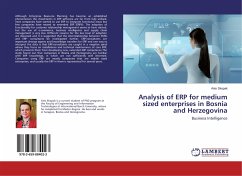Although Enterprise Resource Planning has become an established phenomenon the investments in ERP software are far from fully utilised, most companies have started to use ERP to integrate functional areas but few companies have moved to extended ERP (ERPII). The adoption of functionality for customer relationship management seems to have started, but the use of e-commerce, business intelligence and supply chain management is very low. Different reasons for the low level of adoption are discussed and it is suggested that the interrelationship between SMEs and ERP- consultants be investigated further. ERP-consultants are important change agents and knowledge transfers for ERP and one way to interpret the data is that ERP-consultants are caught in a negative spiral where they focus on installations and technical maintenance of core ERP, which prevents them from developing new, extended ERP competence.The study found out that companies in Bosnia and Herzegovina are familiar with ERP knowledge, in which are not sufficiently well informed. Companies using ERP are mostly companies that are middle sized enterprises, and usually the ERP in them is represented for several years.
Bitte wählen Sie Ihr Anliegen aus.
Rechnungen
Retourenschein anfordern
Bestellstatus
Storno








